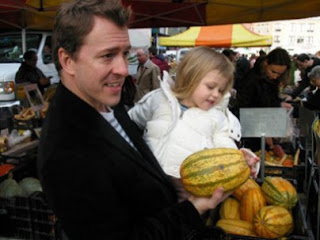Juliette Binoche and Romain Duris in Paris.
Anyone who has been to Paris -- and I'm lucky enough to be able to say I have -- knows that the city has a special, almost ineffable allure. If one were going to design a city meant to appeal to the senses and the mind, Paris might be the place to begin and end. Like all great cities, Paris seems to have a life of its own, a bustle that you know will continue with or without you.
Director Cedric Klapisch has made a movie -- aptly named Paris -- that introduces us to characters whose lives play out against a Parisian backdrop, and you can't always tell which is more significant the characters or the city in which they live.
Klapisch's characters are a diverse group, interesting without being extraordinary. The rail-thin Romain Duris plays Pierre, a dancer whose heart problems soon may cost him his life. Juliette Binoche portrays his sister, a mother of two daughters who has broken up with her husband. She's a social worker.
Fabrice Luchini appears as Roland Verneuil, a professor of Parisian history who has been hired to do a PBS-like show about the historical life of the city. His architect brother (Francois Cluzet) and his wife are expecting a child.
Lonely and aging, Roland desperately needs a fling: Against his better judgment, he sends flowery love messages to one of his students. Will he suddenly find himself in a relationship that restores feelings of youth or will he be crushed on the rocks of reality? Roland and his brother, by the way, have just lost their father, a fact that Roland seems intent on ignoring.
The characters move around the city. Sometimes they shop. While buying groceries in an open-air market, Binoche's Elise meets Jean (Albert Dupontel), a vegetable seller who catches her eye. He's a refugee from a broken marriage.
Such are the lives in the movie, which is punctuated by views of Paris and the odd vignette. Karin Viard appears as a baker who takes her opinions more seriously than she should. She's a slightly amusing pain in the butt.
Klapisch isn't swinging for the thematic fences here. He's showing us a spectrum of Parisian life, and his characters experience a typical range of joy and sorrow. Only scenes involving a young man in Cameroon fail to blend into the movie's otherwise seamless whole. I'm sure this was intentional, a way for Klapisch to acknowledge the city's growing immigrant population, but this is not a movie about ethnic tensions between Paris' newcomers, many of whom are Muslims, and the city's longtime residents.
For the most part, though, Paris unfolds with an ease that proves increasingly engaging. A mild warning: Klapisch's ending is very French, which means it may bring a frustrated smile to your face. Forget the frustration and focus the smile.














